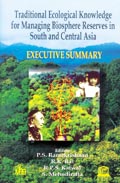Managing biodiversity
 TRADITIONAL ECOLOGICAL KNOWLEDGE FOR MANAGING BIOSPHERE RESERVES IN SOUTH AND CENTRAL ASIA, EXECUTIVE SUMMARY . Edited by PS Ramakrishnan, RK Rai, RPS Katwal and S Mehndiratta . Oxford & IBH Publishing Co Pvt Ltd . 2002
TRADITIONAL ECOLOGICAL KNOWLEDGE FOR MANAGING BIOSPHERE RESERVES IN SOUTH AND CENTRAL ASIA, EXECUTIVE SUMMARY . Edited by PS Ramakrishnan, RK Rai, RPS Katwal and S Mehndiratta . Oxford & IBH Publishing Co Pvt Ltd . 2002
For three decades, Biosphere Reserves (BRs) have helped build the knowledge, skills and attitude required for conservation and sustainable use of ecosystems. After going through all the case studies in BR in developing countries, it is concluded that more location-specific research analysis for basing BR management on a scientific footing is crucial.
The book says that appropriate institutional arrangements have to be made for people's participation, through a bottom-up approach, ensuring that each household takes part in the decision-making process. The interplay of ecology, sociology, economics, anthropology and culture is to be tied together to design meaningful biodiversity management strategies in an ecologically and socially heterogeneous environment, the book notes. Conservation-linked developmental strategies have to be based on a value system that people can perceive and participate in. This should be the basis for promoting the concept of BR in the South and Central Asian context, a region which has rich traditional knowledge and wisdom.
Related Content
- Order of the National Green Tribunal regarding deterioration of Nayar river, Uttarakhand, 05/06/2025
- Access and Benefit Sharing: New rules for use of biodiversity
- Judgment of the Supreme Court regarding conservation and protection of sacred groves in Rajasthan, 18/12/2024
- Order of the National Green Tribunal regarding discharge of untreated water into Jadhav Sagar, Sakhya Sagar and Madhav Sagar lake, Shivpuri, Madhya Pradesh, 19/11/2024
- A framework for monitoring biodiversity in protected areas and other effective area-based conservation measures
- Reducing post-harvest losses in Indian agriculture: a case study of selected crops
